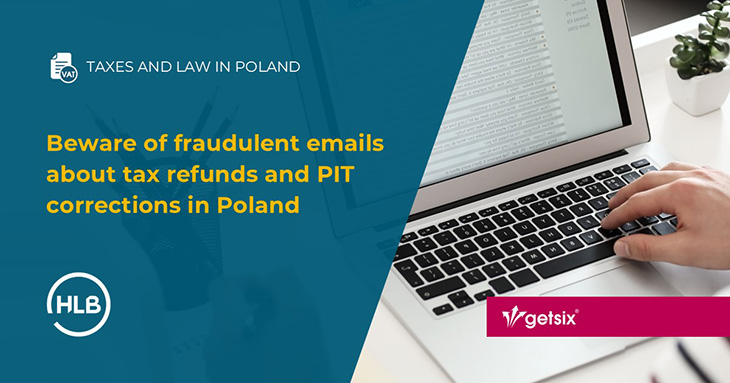Beware of fraudulent emails about tax refunds and PIT corrections in Poland
The tax settlement period in Poland is a time of increased activity for cybercriminals. Scammers are using increasingly sophisticated methods to steal personal and banking data by impersonating the National Revenue Administration (Krajowa Administracja Skarbowa – KAS) and the Ministry of Finance (Ministerstwo Finansów – MF).
In this article:
Most common scam methods
- Fake emails and SMS messages
- Phishing and fake websites
- Impersonating tax authorities
- Fraudulent phone calls
Fraudsters send messages claiming that the taxpayer is entitled to a refund or needs to correct their PIT-17 form. They attempt to lure recipients into clicking suspicious links or opening malicious attachments.
Links in these messages lead to counterfeit websites that closely resemble official government portals. The goal is to steal login credentials or install malware.
Scammers use email addresses that appear official but are actually fake, such as:
prawdziwy_kas@gov.mof.pko360.pl
krajowaadministracjaskarbowa-kas@gov.mof.pekao.pl
Criminals call taxpayers, pretending to be tax office officials, and try to obtain personal details, PESEL numbers, bank account information, or login credentials for tax-related systems.
How do you protect yourself from fraud?
- Verify the sender – official institutions in Poland use email addresses with the gov.pl domain.
- Avoid clicking suspicious links or attachments in emails or SMS messages.
- Use only official government websites – Access Poland’s e-Tax Office (e-Urząd Skarbowy) exclusively through the Ministry of Finance’s official website: www.podatki.gov.pl.
- Never share sensitive information over the phone such as your PESEL number, banking details, or login credentials.
- Update security software and use strong passwords for your accounts.
What to do if you encounter a scam attempt?
Do not respond to suspicious messages or click on any links.
Report the incident to CERT Polska via their website: www.cert.pl.
As cyberattacks become more frequent, staying cautious when handling financial and tax-related messages is crucial. Scammers are continuously refining their techniques to impersonate government institutions and banks. Being aware of potential threats and verifying information sources are fundamental steps in protecting your personal data and financial security.
If you have any questions regarding this topic or if you are in need for any additional information – please do not hesitate to contact us:
CUSTOMER RELATIONSHIPS DEPARTMENT

ELŻBIETA
NARON-GROCHALSKA
Head of Customer Relationships
Department / Senior Manager
getsix® Group
***














